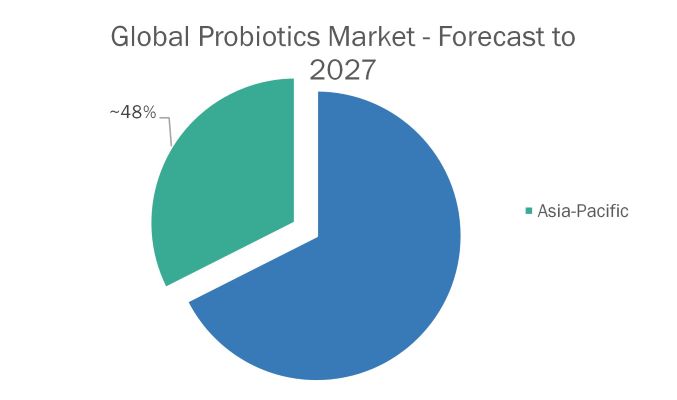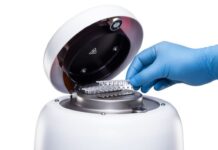People are increasingly turning to probiotics due to a growing awareness of the importance of gut health. The human gut is home to a vast community of microorganisms known as the gut microbiota, which play a crucial role in various aspects of our health. Probiotics are live bacteria and yeasts that benefit our health, especially the digestive system. They work by replenishing and maintaining a healthy balance of these microorganisms in the gut.
Asia Pacific nations have a long history of consuming fermented foods rich in probiotics. Traditional Asian cuisines, such as Korean, Japanese, and Indian, incorporate naturally fermented foods like kimchi, miso, tempeh, and yogurt, which naturally contain beneficial bacteria. This cultural acceptance and familiarity with probiotic-rich foods have laid a strong foundation for the probiotic market in the region. Furthermore, the prevalence of digestive disorders, such as irritable bowel syndrome (IBS) and inflammatory bowel disease (IBD), is rising in the Asia Pacific region. Probiotics are known to have positive effects on such conditions, and as awareness of these benefits spreads, there is a corresponding surge in the demand for probiotic products.
As of 2019, there were an estimated 4.9 million Inflammatory Bowel Disease (IBD) cases globally. Notably, China and the US recorded the highest number of cases, with 911,405 and 762,890 cases, respectively. This translates to a prevalence rate of 66.9 cases per 100,000 people in China and 245.3 cases per 100,000 people in the US. These figures are sourced from a scientific research paper released by the National Library of Medicine in March 2023. The Crohn’s & Colitis Foundation of America (CCFA) article reports that Asians tend to receive diagnoses for Inflammatory Bowel Disease (IBD) at later stages of life compared to Caucasians and African Americans. Additionally, Hispanics typically receive diagnoses at more advanced ages than Caucasians.
The Asia Pacific region is also home to several major probiotic manufacturers and suppliers. Countries like Japan, India, and China are global leaders in producing and exporting probiotic products. The region’s concentration of industry players further cements its influence on the global probiotic market. The global probiotics market is on a growth trajectory, projected to reach USD 85.4 billion by 2027, as stated in the Markets and Markets report, “Probiotics Market – Global Forecast to 2027”. Within this market, the Asia Pacific region is anticipated to contribute to 48% of the global market total by 2027. China stands out as a major player, making up approximately 36% of Asia and 17% of the global market by 2027.
The major players in the global market include companies like Probi (Sweden). Nestle (Switzerland), ADM (US), Danone (France), International Flavors & Fragrances Inc. (US), Yakult Honsha Co., Ltd. (Japan), General Mills Inc. (US), Chr. Hansen Holding A/S (Denmark), BioGaia (Sweden), Morinaga Milk Industry Co., Ltd. (Japan), SACCO System (Italy), Winclove Probiotics (Netherlands), AB-Biotics (Spain), Glac Biotech (Taiwan), Lallemand (Canada), BIOHM Health (US), Sun Genomics (US), Unique Biotech Ltd. (India), Probiotical S.PA (Italy), Adisseo (China), NextFoods, Inc. (US), Lifeway Foods, Inc. (US), i-Health Inc. (US), Suja Life, LLC (US), and So Good So You (US). Majority of these global players have their operations and sales network in Asia Pacific.
Here are some prevalent trends in the probiotics market:
- Expanding Product Range: Probiotics are incorporated into a wider range of products beyond traditional yogurt and supplements. This includes functional foods, beverages, snacks, skincare, and pet products. For instance, in June 2022, Danone introduced Activia+, a multi-benefit probiotic yogurt drink. This launch marks a significant step in expanding Danone’s specialized nutrition segment. Similarly, in April 2022, Nestle unveiled an infant cereal, the first to combine whole grain gluten-free oats, pulses, veggies, fruits, and probiotics. This innovation aims to nourish infants’ cognitive and physical development while broadening Nestle’s infant probiotic portfolio.
- In October 2021, General Mills introduced Doolies, a fruit and fiber-packed snack for young children. Notably, it contains the stable probiotic BC-30, which supports digestive and immune health. This product release represents a strategic move by General Mills to expand its probiotics portfolio, catering specifically to the younger demographic. These launches underscore the industry’s endeavor to diversify probiotic applications, meeting consumers’ evolving demands and preferences across various age groups and product categories.
- Diversity in Delivery Formats: Besides traditional capsules and tablets, probiotics are delivered through innovative methods like gummies, powders, sprays, and even patches, providing more options for consumers. For instance, Henry Blooms Health Products (Australia) offers Lady-Lac Probiotic Intimate Spray, which is a portable probiotic to maintain intimate area freshness throughout the day by balancing microflora.
- Focus on Gut-Brain Connection: Emerging research highlighted the strong connection between gut health and mental well-being. This led to an interest in probiotics that could support mental health and alleviate conditions like anxiety and depression. For example, Chr. Hansen Holding A/S (Denmark), a company specializing in probiotics, highlights the benefits of strains like L. acidophilus, DDS-1, and Bifidobacterium UABla-12 in promoting gastrointestinal (GI) health. Scientific studies suggest that these probiotic strains may aid in reducing abdominal discomfort and distention, support comfortable bowel movements, improve the overall quality of life, reduce issues related to digestive health, and alleviate occasional issues like loose stool and irregularity.
- Probiotics for Pets: The market for probiotics tailored to pets was growing. Pet owners increasingly sought probiotic supplements and pet food with added beneficial bacteria for their furry companions. On August 30, 2021, Chr. Hansen introduced a range of stable live probiotics for pet foods and supplements.
- HANSEN PET-PROSTART: Targeted at growing puppies, kittens, and their mothers during pregnancy and lactation.
- HANSEN PET-PROESSENTIALS: Designed for the essential needs during adulthood, supporting normal health and everyday well-being.
- HANSEN PET-PROVITAL: Tailored for senior dogs and cats above 7 years of age.
This move caters to the increasing demand for natural and effective solutions from a new generation of pet owners. The probiotics were tailored for different life stages of dogs and cats.
Thus, the market was characterized by a diverse range of products, including supplements, functional foods & beverages, and feed, catering to varying consumer preferences and dietary habits across the region. Key players in the industry focused on R&D to introduce innovative strains and delivery formats, further enhancing the market’s competitiveness.









